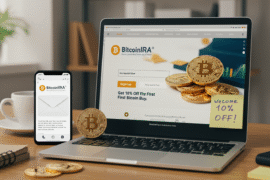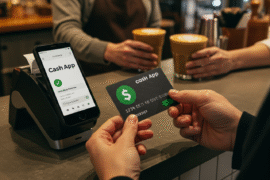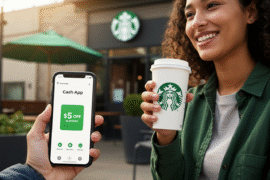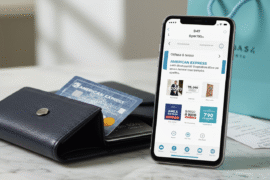This article may contain references to products or services from one or more of our advertisers or partners. We may receive compensation when you click on links to those products or services. Nonetheless, our opinions are our own.
The information presented in this article is accurate to the best of our knowledge at the time of publication. However, information is subject to change, and no guarantees are made about the continued accuracy or completeness of this content after its publication date.

Updated by Albert Fang
Apply referral code: 55AGK for 2,000 free bonus fetch reward points.
How to Earn Fetch Reward Points
Users of Fetch Rewards, a points rebate service, can earn rewards by making purchases of participating retailers’ and manufacturers’ products. Fetch Rewards accepts most receipts regardless of whether the business is a partner or not. However, users can maximize their points by buying at partner businesses, at specified times, or with specific brands. When a user reaches a predetermined point total, they are given the option to exchange those points for gift cards. You can choose from a wide variety of stores like Walmart and Target, coffee shops like Starbucks, or a universally accepted payment method like a physical or digital Visa card.
But first, the user should have a basic understanding of how points work. Exactly how much are Fetch points worth? To begin, it’s not a straight dollar-for-points exchange. For instance, 1000 points is not the same as $1000. Instead, you’ll get a dollar’s worth of value for just 1000 points. While there are occasions when customers can obtain a 3,000-point sign-up bonus for joining Fetch Rewards, the standard minimum reward for scanning a receipt is 25 points. It may take some time to accumulate the 10,000 points required for the first redemption, and 3,000 points for each subsequent redemption, although the user can earn additional points if there are partner brands or other bonus point features on it. The points alone aren’t worth much, but they can add up quickly if the user takes advantage of available promotions and bonuses. A user can earn thousands of bonus points by inviting their friends and relatives using a unique referral code.
Suggested: Vantazo Receipt Template
How to Redeem Fetch Reward Receipts
Users can earn points with Fetch Rewards by scanning paper receipts or connecting their accounts with online retailers for electronic receipts. The app then analyzes the data to determine an appropriate number of points to award for the receipt, taking into account the user’s shopping history and preferences. While some Fetch Rewards members may not be concerned about the fate of their receipts once they’ve been entered into the system, others may have concerns. Fetch monetizes itself by selling customers’ shopping data to firms that utilize it for research purposes. This essentially means that your shopping receipts are being sent to a company whose sole purpose is to analyze your purchasing habits. As stated on the Fetch Rewards website and user agreement, customer privacy is protected by encryption, which also aids businesses in conducting in-depth analyses. Nobody’s name or address is ever given out, but people’s shopping habits are. The goal is for these businesses to analyze patterns across a wide customer base. In addition, Fetch emphasizes that they do not disclose trends and information through the saved receipts, as this is information that marketers then use to develop advertising strategies. Financial data, Social Security numbers, credit card details, or PayPal details are not collected by Fetch.
Summary
Fetch Rewards may look like just another cashback or rewards program on the surface, but behind the scenes, it’s a data collector that compiles information from millions of users. Due to the fact that the conventional technique of submitting surveys is not only time consuming and often fruitless, but also that consumers are not always truthful on such surveys, this information gleaned from Fetch Rewards is highly significant within marketing research. Receipt scanning delivers vital, authentic information to marketing firms in the form of raw, solid data that cannot be easily manipulated. Given that many other online service providers, like Google, acquire and track user data and habits in similar, non-anonymous ways and with less security than Fetch does, users probably shouldn’t worry too much about how their information is utilized on Fetch. To put it plainly, Fetch poses about the same level of risk as any other software you use regularly. If you’ve ever asked yourself “how much are Fetch points worth” and “what does Fetch do with your receipts,” hopefully this article successfully answered your questions.
Apply referral code: 55AGK for 2,000 free bonus fetch reward points.
FAQs
1. When collecting information, does Fetch Rewards use encryption, and if so, what type?
According to the site, a whole staff of cyber security professionals is responsible for protecting visitors’ personal information at all times. Encryption is equal to the type utilized by financial institutions online.
2. Does Fetch Rewards make any use of user information in-app?
To earn more points, customers will often be presented with offers that are specific to their interests and purchasing behaviors.

Reviewed and edited by Albert Fang.
See a typo or want to suggest an edit/revision to the content? Use the contact us form to provide feedback.
At FangWallet, we value editorial integrity and open collaboration in curating quality content for readers to enjoy. Much appreciated for the assist.
Did you like our article and find it insightful? We encourage sharing the article link with family and friends to benefit as well - better yet, sharing on social media. Thank you for the support! 🍉
Article Title: How Much Are Fetch Rewards Points Worth? What Does Fetch Rewards Do With Your Receipts?
https://fangwallet.com/2022/11/19/how-much-are-fetch-points-worth-what-does-fetch-do-with-your-receipts/The FangWallet Promise
FangWallet is an editorially independent resource - founded on breaking down challenging financial concepts for anyone to understand since 2014. While we adhere to editorial integrity, note that this post may contain references to products from our partners.
The FangWallet promise is always to have your best interest in mind and be transparent and honest about the financial picture.
Become an Insider

Subscribe to get a free daily budget planner printable to help get your money on track!
Make passive money the right way. No spam.
Editorial Disclaimer: The editorial content on this page is not provided by any of the companies mentioned. The opinions expressed here are the author's alone.
The content of this website is for informational purposes only and does not represent investment advice, or an offer or solicitation to buy or sell any security, investment, or product. Investors are encouraged to do their own due diligence, and, if necessary, consult professional advising before making any investment decisions. Investing involves a high degree of risk, and financial losses may occur including the potential loss of principal.
Source Citation References:
+ Inspo












































